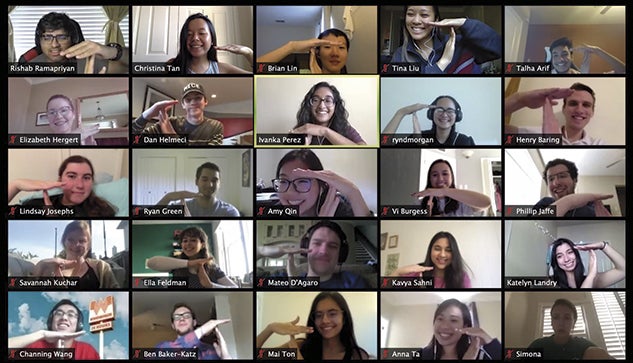Stop the Presses
Even as the Thresher staff reported on the pandemic, we kept wishing we wouldn’t become part of the story.

The last time I was in a crowd, it was in the Academic Quad. We all looked ridiculous, a bunch of seniors wearing half-baked graduation outfits; some wore stoles thrown over the only dress they hadn’t yet packed, while others showed up in sweatpants and T-shirts.
It was two months before we were supposed to graduate, but the day before, we received a gut-wrenching email informing us that classes would move online for the rest of the semester and that most students had to vacate campus as soon as possible. As we scrambled to pack our belongings — college flags, half-filled notebooks, useless items tinged with memories that suddenly felt precious — a thought struck me. We might never have an in-person graduation ceremony, might never get to finally walk out of the Sallyport, might never make use of the stoles crammed haphazardly into suitcases.
In reality, the Thresher staff had been readying the campus months in advance. Our COVID-19 coverage started in late February and escalated after a Rice research staffer fell ill. Still, we carried on with our lives, even while the impending crisis was gathering in the background, preparing to crescendo.
That thought, once unfathomable, now felt like a real possibility. So I opened Facebook and made an impromptu graduation event for the next day. Whether or not we were ready, we would walk.
Two days before that fateful email, I was sitting in the Thresher’s office, poring over the final versions of that week’s paper. As editor-in-chief for the year, I had led a particularly sobering production meeting in an empty student center. I outlined the Thresher’s plans “on the off chance we have to leave.” These included online coverage, maybe an email newsletter, reducing expectations, paying staffers through the semester and reallocating roles.
When Kelley Lash, our staff adviser, asked me if I wanted to make a note about this possibly being the last print issue of the year — and thus the last print issue I’d be able to oversee as editor — I laughed, knocked on wood and said that wouldn’t happen. Despite all of my contingency plans, I wasn’t ready to let go of the paper and the people I had spent my last four years with.
In reality, the Thresher staff had been readying the campus months in advance. Our COVID-19 coverage started in late February and escalated after a Rice research staffer fell ill. Still, we carried on with our lives, even while the impending crisis was gathering in the background, preparing to crescendo. We read the news and tracked the daily rise in cases but held on to our plane tickets and our plans for spring break, Senior Week and summer. We kept knocking on wood, but the notes of disaster grew louder.
When I created an impromptu Facebook event for seniors to walk through the Sallyport, I wasn’t ready for the messages warning me against it because it didn’t abide by social distancing rules limiting gatherings, at the time, to 25 people. I wasn’t ready for more than 100 people to show up for our intense feelings of loss and pride.
When the time came for us to walk, our small group of seniors — about a tenth of the graduating class — milled around the quad, waiting for guidance. Questions flew. Should we go in founding order? How long can we be here before we get in trouble? Should I walk now, or when we have our real graduation? What if we never get to have a real graduation? Can I hug you? Can I be near you?
A friend, one of the few remaining students on campus, said he sees the last issue of the Thresher everywhere. “It’s ghostly,” he said, the way that the headlines are trapped in the past. “Rice suspends classes,” the front page reads, blissfully unaware of the headlines that will soon follow: “Faculty prepares for transition to online classes”; “Students remaining on campus adjust to regulations”; “On-campus commencement postponed”; “Faculty Senate discuss fall semester concerns”; “US coronavirus cases surpass 1 million with more than 56,000 deaths.”
It feels as if picking up one of these ghostly papers could reverse time to allow the Thresher staff to write our goodbye columns and cry in the office together one more time. Instead, the paper remains as a memory of being on the cusp of understanding but staying in denial. Its serene confidence in the future reflects the sobering realization its staffers — and by extension, its editor — have come to: Despite being the people with all the answers, drilling deep to investigate and inquire, there are some things we aren’t prepared to answer. Instead, we knock on wood and keep our fingers crossed, not ready for what comes next but facing it all the same, anyway.
Christina Tan ’20 served for four years as a staff member of the Rice Thresher and was the editor during the 2019–2020 academic year. After graduating with a degree in cognitive sciences, she is spending the summer working for a startup and helping run a mutual aid effort in Houston to address COVID-19 and racial inequity needs.
